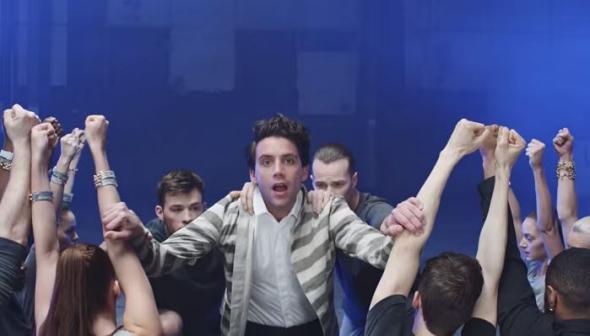It might be because I recently published a long meditation on gay male culture and history, but damn if Mika’s new single “Good Guys” and the accompanying video doesn’t have me a little teary in the office today. The bittersweet song, which is from the openly gay artist’s fourth studio album No Place in Heaven (out June 16), is a psalm of pining for the gay past, explicitly so—the first stanza ends by asking “Where have all the gay guys gone?”
Mika’s skill as a songwriter is on full display here in a gorgeous arrangement benefiting from lush string, piano, and children’s choir writing. But the real draw is the song’s lyrical construction. Mika clarifies that he’s not just nostalgic for the heady days of pre-AIDS gay liberation (“It’s not the cowboys that I’m missing anymore/ That problem was already old in ’94”), but instead looking back to a time when gay men saw themselves as having something special to offer to the mainstream, or at the very least to each other. He acknowledges that gay exceptionalism is out of fashion these days (“Don’t be offended, this might seem a little wrong”), but then repurposes a line of Oscar Wilde’s into a moving hymn to the power and insight that can come from oppression: “If we are all in the gutter, it doesn’t change who we are/ cause some of us in the gutter are looking up at the stars.”
The most touching part of the song is Mika’s séancelike summoning—“To all my heroes that were dressed up in gold/ only hopin’ one day I could be so bold”—of all the gay figures that have inspired him: W.H. Auden, James Dean, Walt Whitman, Cole Porter, and Jean Cocteau, among others. This pantheon comes after a striking bit of songcraft, in which Mika shifts “gay guys” to “good guys” in his question, insisting on the still-powerful equivalence “gay is good.”
The video, a stately contemporary dance number, is a perfect match for the song. Mika is moved around like a doll through a number of different personas by the dance troupe: a straight-laced businessman, a queen, an astronaut, and a prisoner sentenced to hard labor—probably a reference to Wilde’s debilitating time behind bars for “gross indecency.” Indeed, much of the choreography communicates a tension between external constraints and a desire to escape—a struggle all too familiar to the gay men Mika misses, and to many of his contemporaries today.
